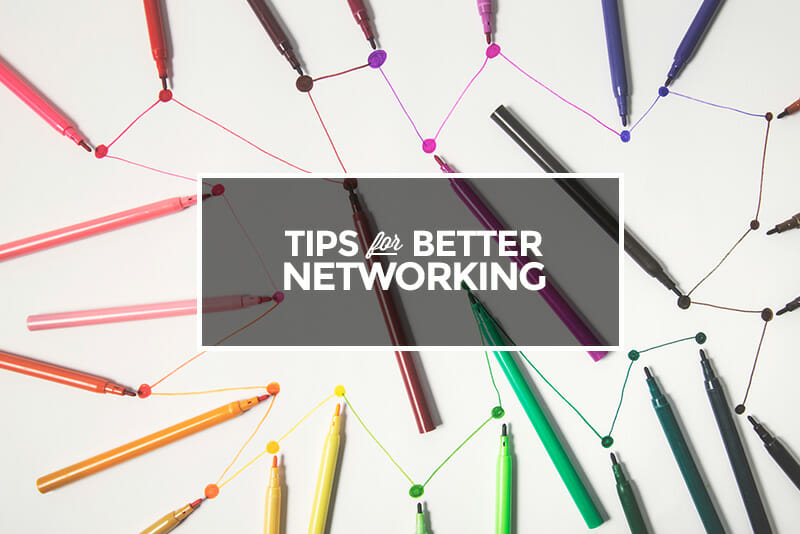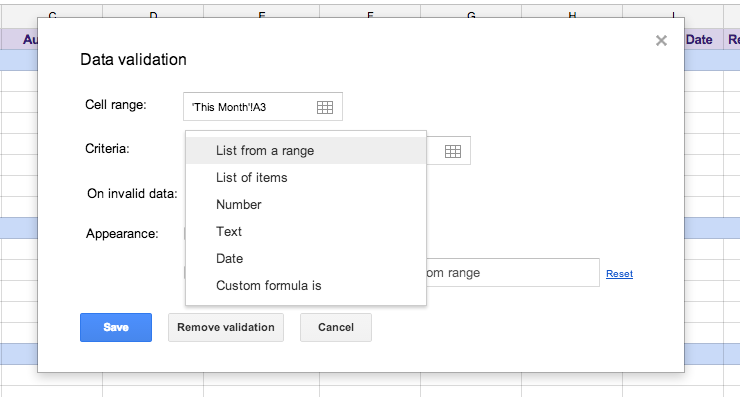Hate Networking? Here are 27 Tips to Make it Less Painful
Expert answers to your questions on how to network your way to a successful career in tech


You know the scene: you walk into a large, carpeted foyer with a huge nametag tugging at your neck, a little plastic cup of pink punch, and a stack of business cards to hand out.
It’s time to network with this room full of industry leaders.
::Gulp::
But even if you have a slight to moderate case of social anxiety (don’t look at me!), networking doesn’t have to be a stilted, awkward ordeal.
In fact, as networking expert Kelly Hoey says, “Every human interaction is networking.”
Networking can be everything from rubbing elbows at a conference to meeting a new acquaintance for coffee, or even participating in a Twitter chat. And I can speak from experience! In 2014, I got hired at Skillcrush…via Gchat.
Last month, I got the chance to sit down and talk with speaker, author, and investor Kelly Hoey. We talked about how to be a networking pro in an era where you can get hired (and fired) on Twitter, and all about the strategies she used to make her own major career change.
Our talk was part of the Skillcrush Land Your Dream Job Webinar Summit, a free 2-day web clinic packed with invaluable job search advice from expert guests. If you didn’t attend, I highly encourage you to take a look at what you missed and catch up on all the replays. You can also get caught up on everything we covered by searching #DreamJobSummit on Twitter.
Kelly’s webinar in particular was so valuable. (In the replay, you might notice me feverishly taking notes!) I learned all about how to handle awkward situations while networking, make connections even when you don’t live in a major city (or a city at all), use Kelly’s networking techniques to make a place for yourself when you’re new to a career field, and use your LinkedIn and online presence to build relationships with movers and shakers in your industry.
Kelly answered dozens of questions live, and for those she didn’t get to? She’s covering them ALL here. Below, you’ll find Kelly’s answers to real questions from the webinar summit, including her advice for:
- Networking when you have too many irons in the fire (read: you have more than one job or identity!)
- How to use networking tools to change careers when you feel stuck
- Tips for building a network around yourself when you think you don’t know anyone
- All her best practices for using the Internet and social media to network
- Networking dos and don’ts for the modern world
For years, I avoided networking (and all the sweaty palms and awkward introductions I thought it entailed), and I don’t want that to happen to you.
Check out Skillcrush’s free ebook, The Ultimate Guide to Non-Sleazy Networking. In the 40+ page guide, you’ll get: tips for overcoming paralyzing networking jitters, a complete plan of action for conquering networking events, 3 done-for-you email templates for following up with new connections, and lots more!
Kelly originally answered these webinar questions on her blog. And make sure to check out her site and go follow her on Twitter. Reach out and tell her how you found out about her!
Here’s Kelly:
How to Make a Graceful Career Change
1. What networking advice would you give career changers? (Phyllis)
Before you start knocking on doors for informational interviews or booking coffee dates to pick a friend’s brain for ideas on your next career, spend some time researching and exploring what you want to do first:
What’s the career you’re dreaming of? Are you seeking higher pay? More flexibility? A more collaborative work environment?
Document your ideas and ambitions, whether it is on a vision board or spreadsheet—then sit back and examine what it tells you.
My guess is you know what you’d like your next career story to be! And here’s why you need to do some self-reflection and research before you start networking to change careers: it is easier to ask for help—and you’ll receive better advice—if you know what you want (or at least the direction you’re headed).
2. I’m trying to bootstrap my own business and want to find a part time admin/PA job to help me gain a bit more experience within an already established business. Do you have any tips for finding your first entry-level business job when you don’t have any degrees to lean on? (Emily)
My guess is you’ve got a lot of valuable skills to offer someone if you’ve been bootstrapping your own business. What are they? Then think about the types of employers/companies who could use your particular talents. Sell your skills and experience—don’t focus on your lack of a degree. Take a look at temp firms and freelance opportunities to help you land a role.
3. I recently swapped jobs and I’m going back to study for 2 years later this year. How should I go about maintaining my networks from my previous work while I’m studying? (YS)
In addition to the suggestions I made to Julissa, communicating around holidays and special events is an old-school way of staying in touch. Take a look at Red Stamp, they have a great selection of cards which can be personalized and sent online (for free) or you can pay to have them post it for you.
And let me say, the fact you are planning ahead on the ways to stay in touch with your existing network simply makes my day!
4. I am just starting my career change from mental health to tech. I hope to start job searching by the end of the year (Nov/Dec) once I am skilled up and have a strong portfolio, although I am starting the networking process now. My question: My LinkedIn account is full of former colleagues and I feel a bit hesitant about shifting all of my information over to tech skills until I am confident that I am launching the job search (really going for it). Do you have any suggestions/advice for navigating the timing of this awkward period while I am gathering contacts while my LinkedIn does not reflect the career shift? (Andrea)
My first thought is “why are you worried about your colleagues”? Generally, these are some of the best people to help you find new work. That being said, simply go into “Privacy & Settings” and turn off your “sharing profile edits” notification.
How to Build a Network from Scratch
5. I’ve been a stay-at-home mom for quite a few years, and my network has collapsed! My former jobs and college contacts just seem to have faded away. Where do I start!? Getting back into the workforce is a challenge if you don’t already know people in the industry it seems. My current solution is to make a mock-up for an improved website for my kids’ school and a portfolio to show online. Any other ideas? (Miriam)
Get online, polish up your online profiles, and start reconnecting with you past colleagues and classmates. They may be equally responsible for fading away and more than delighted to reconnect with you. And don’t overlook the network you’ve made being a stay-at-home mom. Have you chatted with other parents about topics other than kids or school? If you haven’t, now is the time to start, as you never know who can use your skills or services. Don’t forget to lean in to your college alumni community, too.
And your idea for a mock-up for an improved website for your kids’ school is genius! Be sure to link to it in your social profiles!
6. I am a recent undergrad, I went to school in the UK and I am back home in California now. I would really love to learn how to network to help my job search since I don’t have access to university student or undergrad job fairs here in the states. (April)
Check with your school in the UK—who can they connect you with? (Peers, colleagues at U.S. educational institutions, plus, most importantly, alumni who may be in California).
Think about volunteering with professional groups whose members work for the types of companies you’d like to work for. As my friend Jennifer would say, “handing out nametags at an event is the best way to get to know everyone on a first-name basis.”
7. I work in advertising and have tried networking with my network in the past, but to no avail. Most of the people who I reached out to ignored my email. The only people I heard from were those also looking for a job. Even though I have always tried to help others in advertising, I find most people don’t reciprocate. Any suggestions for networking in an industry where helping out others doesn’t seem to be commonplace? (Blythe)
Ouch! I hate to think the industry is so “me me me” and doesn’t reciprocate. That’s a big challenge. Think about the ways you can stay true to your values and help those in the industry get more of what they want.
For example, nominate someone for an industry recognition or promote their event via your social channels. Are their committees or projects you can work alongside them with, so you can get to know each other in the course of achieving a common goal? Aligning of interests may be a way to get them to reciprocate.
How to Network Remotely
8. How can I build a network remotely? (Destino)
One contact at a time, and by bringing who you are offline to your interactions online.
If you’re looking to grow your work connections, focus on LinkedIn. You may also want to look at networking opportunities with the niche communities building their networks on MightyBell (Skillcrush has a group).
Aim to create multiple touch-points to stay top-of-mind with the connections you make: follow them on Twitter or Instagram, connect on LinkedIn, sign-up for their newsletter or comment on their blog posts. And when the opportunity presents itself, jump on Skype or Facetime instead of messaging or emailing, and deepen your connection with that [online] face-to-face conversation.
9. How do you network overseas? How do you keep yourself relevant in your circles while living abroad? (Julissa)
This is where online platforms come in so handy—you can see and watch what other people are doing, something we tend to forget when we’re busy posting selfies and tweeting madly.
Take the #DreamJobSummit webinar as an example. By posting questions during the video, you were networking! You (and everyone else) also had the chance to engage with each other by using the chat feature.
You may also want to consider posting updates regularly on some aspect of your life abroad that your global contacts would find intriguing (food, culture, arts). This could be posted online or sent to a close group via email.
10. Can you address how someone who needs to telecommute due to living in a rural area can use your strategies? (Cathe)
My strategies are equally applicable (and adaptable) for you (see my answers to Augustine, Julissa, and YS). I’d simply suggest ensuring there is some face-to-face online networking in your regular communications. Leverage Skype or Facetime or G+ Hangouts versus simply taking a conference call or faceless online meeting, whenever you can.
11. Live networking events aren’t an option for me. Any suggestions for online networking? (Anita)
In addition to the suggestions I’ve made—from the completeness of your online profile to re-tweets, commenting on blogs (as well as blogging), and attending online webinars (such as #DreamJobSummit)—think about:
- Participating in Twitter chats (I took part in one recently with @PFCosmetics for #Instaready) where you can share your point-of-view with a community of interest
- Consider also asking questions and engaging in online programming as it is happening and then sharing takeaways (plus links) with your network after the fact (on social platforms or in a good old email)
How to Network When You Have More Than One Job
12. My main identity is something other than coding/tech (I’m an actor/producer), but I want to start building a network to get tech jobs. How do I leverage my bio/ social networking to get jobs, without losing my identity as a theatre artist? (Christy)
You are (like many of us) living the “slash” career. You’re not just doing one thing—and in the new economic reality, I believe this is the norm. I see you as a creative who is expressing your talents on stage and in code. Embrace it! And here’s an article on the “slash” career phenomenon that may help too.
13. Regarding slash profiles, if you want to keep your coding career secret from your current company because they are not complimentary, do you have any advice? (Diane)
Not complimentary, as in completely different? If that is the case, check out my answer to Christy on embracing the slash career.
If it is a question of highlighting a side-career with a part of your network you’d rather not share it with, see my answer to Andrea, regarding LinkedIn notifications.
You may also want to consider getting coding work referrals through an agency, platform, or other source (friend in the tech world) so you don’t have to directly advertise your services.
Networking Dos and Don’ts
14. What are signs that the person you’re talking to could actually be a valuable connection (or not)? How can you exit a conversation as politely as possible that doesn’t seem to be fruitful? (Bianca)
You never do know, so it’s best to keep an open-mind versus a transactional mindset when you’re networking. That being said, know your values! You may meet someone who appears to be able to help you, but if their value-system isn’t aligned with yours, it is not a worthwhile connection in my book.
Keep it polite and honest when you’re exiting a conversation (we’ve all had moments at a networking event when we’ve been stuck talking to someone for too long). Simply saying something along the lines of, “I know we both are looking to meet more people at tonight’s event, so let me say it’s been lovely chatting with you and I hope you enjoy the rest of your evening,” should aid you in exiting gracefully.
15. Should I wait until I have at least 1 project in my portfolio, before networking as a web developer/coder? (Valerie)
Absolutely not! Get started now! The people you meet right now may help you as mentors and be leads for projects or assignments down the road.
16. I left my last job due to a hostile work environment. I don’t know how to approach discussing it when I network. I don’t want to sound too negative. I loved the job, but hostile incidents with my direct supervisor ultimately led me to leave. How do I make this sound good? (Ashley)
I’m sorry you had to leave a job you loved! But that is exactly what you focus on and highlight when you’re in an interview. Talk about projects, deliverables and other than a “the work culture was not one where I could succeed” steer the conversation to how your past work experience can help the company you’re interviewing with.
17. When you get an informational interview, how do you know what questions to ask? (Tirzah)
Research! Research! Research! Do your homework and understand why that career or industry is interesting to you, before you walk into the informational interview. An informational interview should not be the initial starting point for exploring a particular role—its purpose is to provide additional information or guidance.
18. How do you network on a budget? Do you need to travel to hackathons, coding events, etc., just to meet people? (Sarah)
You should always know WHY you’re spending your limited resources (time, energy, money) to attend an event, because then it is an investment in your career and not simply a cost (or waste of time).
I’d suggest writing down what it is you’re looking to achieve – what’s your goal (immediate, short-term, and longer-term)? Then reflect on whether the events you’re attending are helping you attain your goals.
You may need to research other events or networking groups to participate in. You could discover that you need to double-down your efforts with a particular group.
As for cost savings—always look to see if there are discounts or volunteer opportunities!
19. Can you please give some advice on the best networking techniques for a freelancer? (Madison)
On top of all the other suggestions to the questions I’ve been asked (which apply to you too) check out Freelance Friday! It’s a monthly co-working meetup for independents, creatives, and entrepreneurs.
20. Is handing out business cards bad etiquette? Is there a proper way to do this kind of thing to get someone to go look at my portfolio? (Meredith)
In the digital era, a business card is still relevant! For me, it is a reminder of a conversation, a face, or handshake. I just ordered a new set of business cards from Moo.com as I know I’ll be at a number of events in the coming weeks, handing them out. My suggestion is to ensure your cards reflect your brand. That is, is the quality of the card reflective of the quality of your work?
21. How do you make an effort to keep a great network once you’ve sort of gotten to a place where you aren’t looking. Typically, I get a little less active when I’m not looking for a new job or something. How can I battle this so it doesn’t seem like I’m using people? (Meredith)
Networking is about building relationships, not just landing a job. Think about the ways you can help the people around you and the ways you can communicate with them, simply to stay in touch (see my answer above to YS). If you’re not looking for anything right now, focus outward. How can you help the people who have helped you in the past?
22. Ever made a networking mistake like unintentionally offending someone? What’s the best way to recover? (Courtney)
I received an “I hope I didn’t offend” email last evening, so my advice is to simply apologize politely and honestly for the misunderstanding! You definitely want to clear the air with the person you may have offended and you don’t want to unnecessarily carry around a bunch of angst. We all make networking mistakes, so don’t torture yourself over this.
Networking and the Internet
23. What are your best tips regarding Linkedin profiles? (Stephanie)
They are right here on my tip list.
24. How does one place their signature on their phone and e-mails? (Augustine)
Your email or voicemail may be the first networking contact someone has with you, so record or write your message in the manner you’d like to be remembered. Warm and friendly? A tenacious hustling entrepreneur?
I use the signature box feature on Gmail to not only direct people to the best ways to reach me, but also to highlight a project or something I’m working on. My email signature currently reads:
Kelly Hoey
Author of the forthcoming book Build Your Dream Network (January 2017 / Tarcher Perigee)
Inc.com columnist
myturnstone.com contributor
@jkhoey
Are you on my mailing list? Sign-up for Build Your Dream Network updates as well as events and my insights on networking, connecting and other stuff.
25. Would it be pertinent to have your job #1 / job #2 on your LinkedIn title? Or would it look tacky? (Christine)
It could, but then again, maybe not. Why don’t you take some post-it notes, write down your title, responsibilities, and other keywords, and play with possible LinkedIn titles by flipping the order of the post-it notes around? Realize what you call yourself and how you choose to present yourself to the world is in your control.
26. Can you tell me how to build a profile on LinkedIn when you’re just starting? (Rawl)
Check out my LinkedIn tips for tips on creating a strong profile. If you’re just starting to build your profile, a strong suggestion: look at the profile sections on LinkedIn (experience, languages, honors/awards, projects, organizations, volunteer) then plan what you want to say in each of those sections by creating a word document you can edit, spell-check then copy/paste into the appropriate sections on LinkedIn. You want to give your profile some thought and not leave it half-completed online.
27. What are your tips on Twitter networking? (Anika)
I love Twitter! I think of it as a cocktail party and I try to be the good guest who gets invited back. That’s my best tip. And realize that getting followers comes from showing up at the party. I’ve been on Twitter since 2009.
One last thing: Do you have a website or a blog I can follow? (Kirby)
I sure do!
- I post on Medium.
- I write a column on Inc.com.
- I have an interview series “Founder Focus” on MyTurnstone.
- I also write a weekly newsletter “Innovator Insights”. Here’s a recent edition and here’s where you can sign-up for it.
To get more of Kelly’s tips and hear her talk about her personal career transformation, watch the webinar replay (and catch the other speakers from the Skillcrush Land Your Dream Job Summit).
And don’t forget to check out Skillcrush’s free ebook, The Ultimate Guide to Non-Sleazy Networking. You’ll get a 40+ page ebook that includes a list of foolproof networking dos and don’ts, strategies for EXACTLY how to leverage social and other online networks in your favor, a roadmap to one-on-one networking that makes everyone happy, plus tips for keeping communication open for the long haul, AND the definitive list of how to (and NOT to) cash in on your connections.





